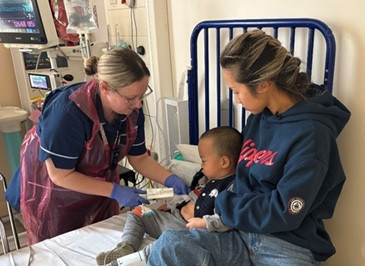
The parents of a three-year-old boy born with a life-limiting genetic disorder are expressing newfound hope for his future following a groundbreaking stem cell gene therapy treatment. This innovative procedure was developed by researchers at the University of Manchester and administered at the Royal Manchester Children’s Hospital (RMCH).
In February, Oliver (Ollie) Chu underwent treatment for Hunter syndrome as part of a clinical study conducted in collaboration with the Manchester Centre for Genomic Medicine at Saint Mary’s Hospital. Both institutions are part of the Manchester University NHS Foundation Trust (MFT), with the University of Manchester managing and sponsoring the trial.
Understanding Hunter Syndrome
Hunter syndrome, also known as mucopolysaccharidosis type II (MPS II), is a rare inherited condition characterized by a genetic error that prevents the production of a crucial enzyme responsible for breaking down complex sugar molecules. The accumulation of these sugars in organs and tissues leads to severe health issues, including joint stiffness, hearing loss, respiratory and cardiac problems, developmental delays, and cognitive decline resembling childhood dementia.
Currently, the only licensed treatment available is Elaprase, a weekly enzyme replacement therapy costing approximately £375,000 annually per patient. While Elaprase can alleviate some physical symptoms, it does not address cognitive decline. In the UK, around 50 patients receive this treatment.
A New Era of Treatment
Ollie’s recovery from the stem cell gene therapy has been remarkable, offering hope for a better quality of life. The clinical study at RMCH explores a one-time gene therapy that involves extracting the child’s stem cells, replacing the faulty gene, and reinjecting the modified cells. These cells can produce the missing enzyme at high levels and reach the brain, potentially addressing cognitive symptoms.
“Gene therapy is not only safer and more effective, but it enables us to use the child’s own cells, which cuts out the need to find a donor and means we can produce more enzyme for the patient,” said Professor Rob Wynn, Consultant Paediatric Haematologist and Director of Paediatric Bone Marrow Transplant Programme at RMCH.
Professor Simon Jones, a Consultant in Paediatric Inherited Metabolic Disease at the Manchester Centre for Genomic Medicine, added, “Since having the gene therapy, Ollie is no longer receiving weekly Elaprase infusions. Instead, we are observing very high levels of the enzyme in his blood, which is an extremely encouraging sign that the treatment is working.”
Ollie’s Journey and Family Commitment
Ollie Chu is the first of five children with Hunter syndrome to participate in this study. His journey began after his older brother, Skyler, was diagnosed with the condition. The Chu family traveled from California to the UK for Ollie to receive this pioneering treatment.
Ricky Chu, Ollie’s father, expressed the family’s commitment, stating, “Although it was a big commitment to travel to the UK, we want the best for our children. Seeing the difference for Ollie pre-and post-transplant has made us believers.”
Despite the challenges, the Chu family remains optimistic about the future. “Our hope for Ollie because of this treatment is that he will continue to make his own enzymes and live a normal life without infusions,” Ricky added.
Implications for Future Treatments
The success of Ollie’s treatment could pave the way for similar approaches to other genetic conditions. The research is jointly funded by the University of Manchester and LifeArc, a not-for-profit medical research organization, in partnership with the University of Edinburgh and Great Ormond Street Hospital (GOSH).
“This therapy was developed over the course of 10 years at the University of Manchester and seeing this now tested in patients by the clinical team at MFT has been incredibly rewarding,” said Brian Bigger, Honorary Professor at The University of Manchester.
Professor Bigger explained that the therapy adds a short tag to the missing enzyme, allowing it to cross the blood-brain barrier and deliver more enzyme to the brain. This innovation aims to prevent the devastating dementia-like decline seen in children with severe Hunter disease.
As the study progresses, researchers and families alike are hopeful that this breakthrough will lead to more effective treatments for genetic disorders, offering a brighter future for children affected by these conditions worldwide.





